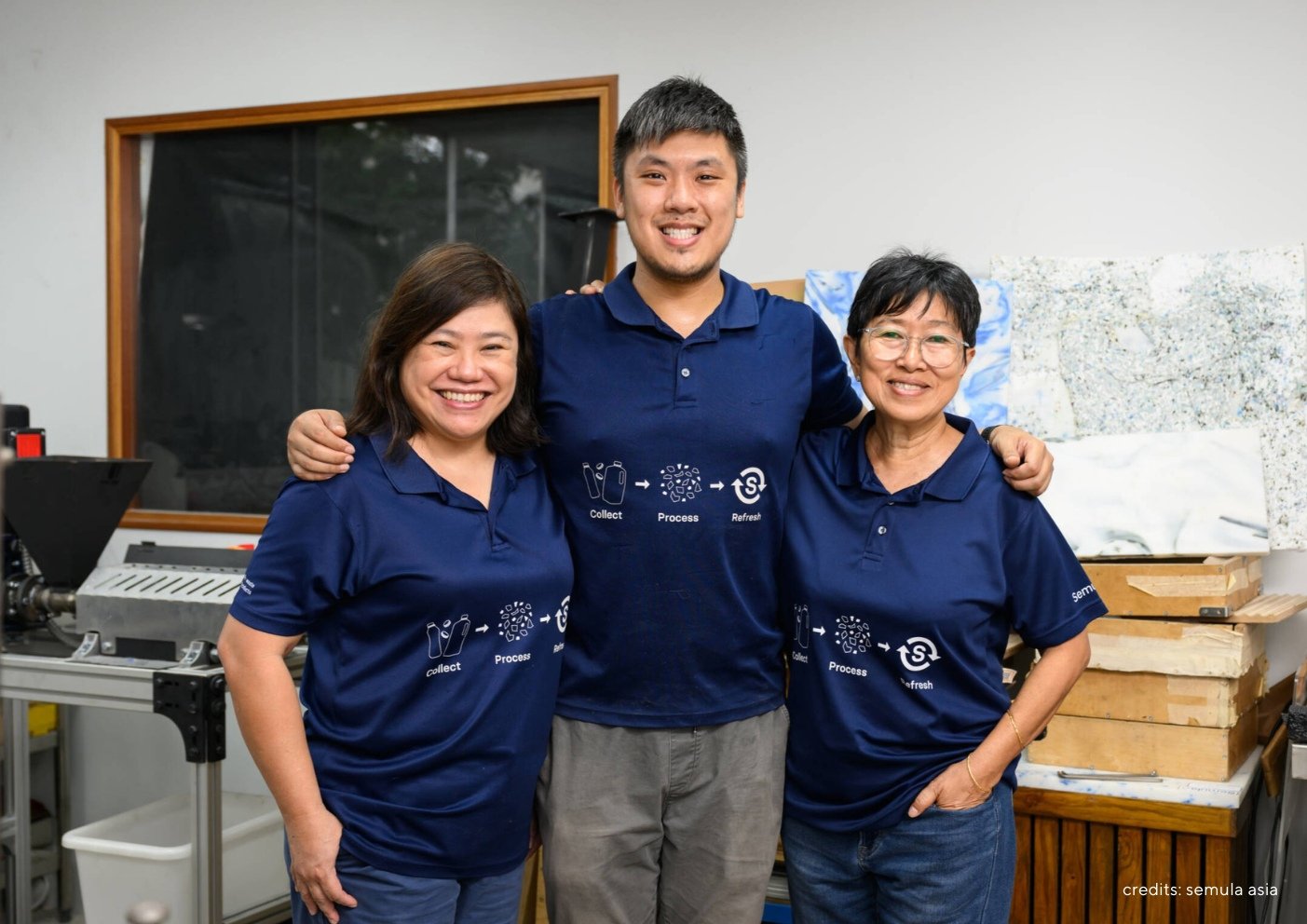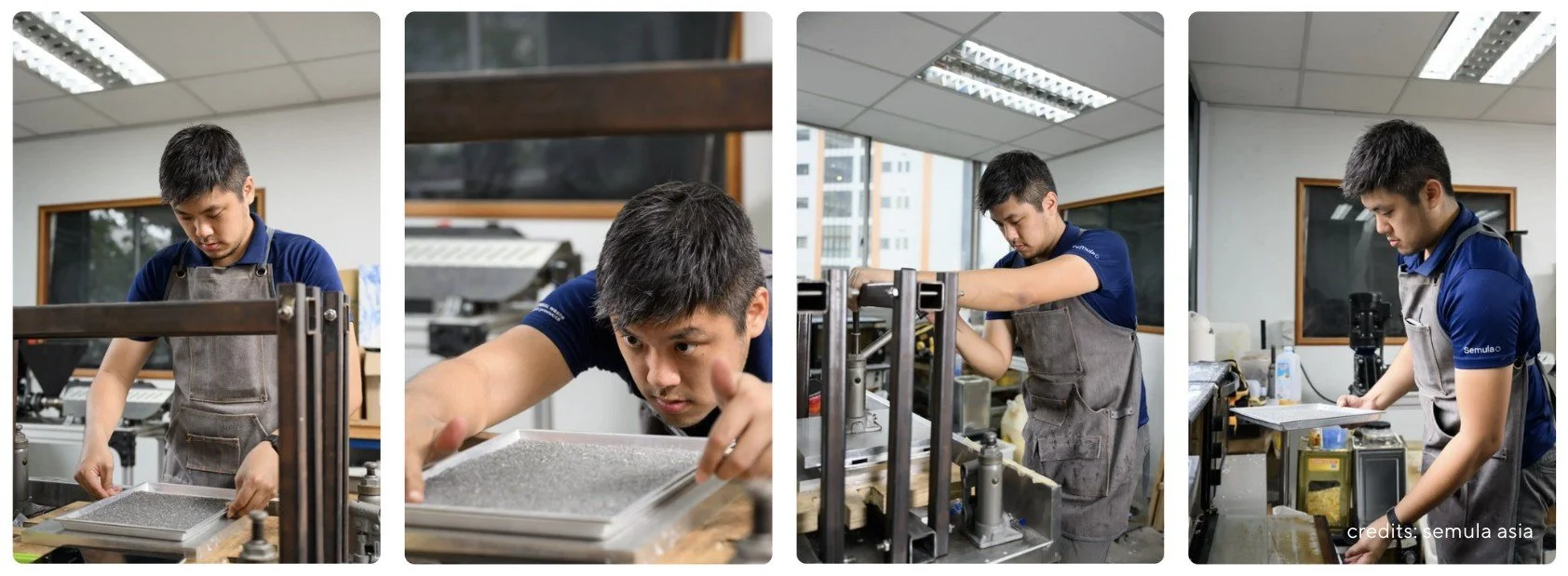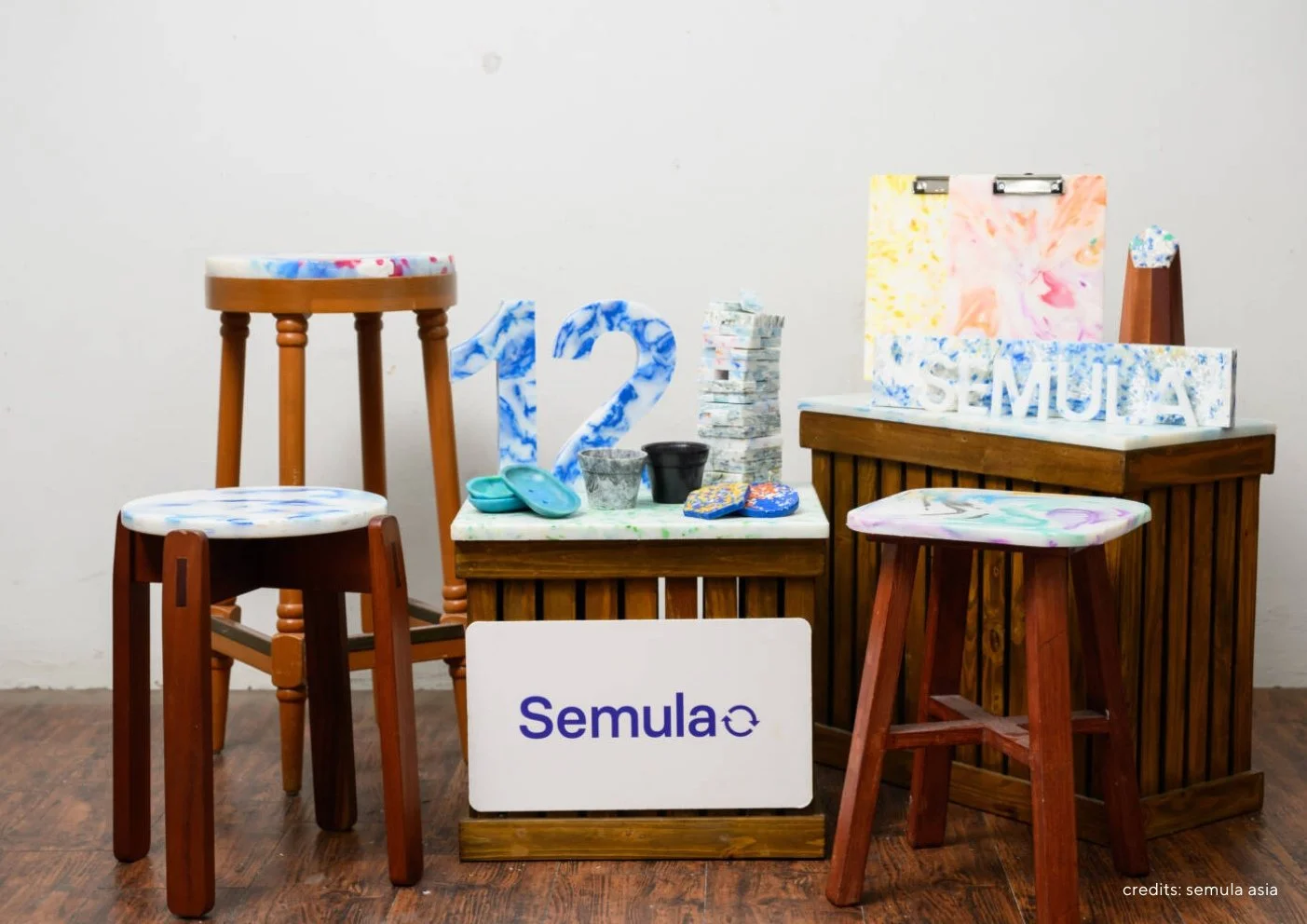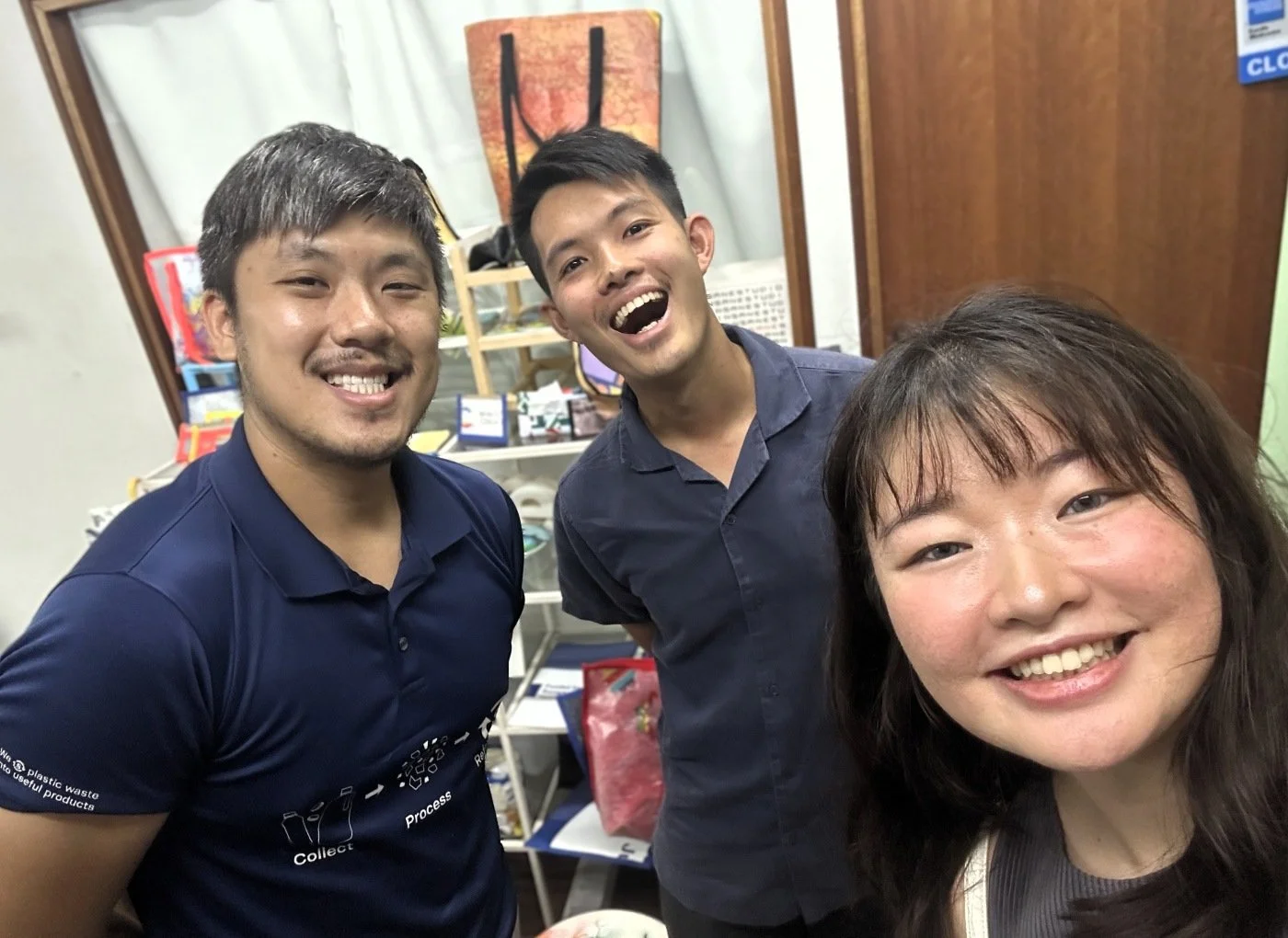#3: Jeryl Yep, Semula Plastics
Poisoned rivers, polluted beaches and turtles dead from ingested plastic — plastic pollution is a serious threat to the health of ecosystems and humans as well. What can be done to reduce plastic waste in the system?
Jeryl Yep saw a unique opportunity in this problem. He co-founded a business that treats plastic waste not as a burden but as a valuable resource that could be repurposed to create functional, beautiful products.
They named their company after the Malay word for renewal and starting afresh: Semula.
Our team at Humans of Earth sat down with Jeryl to learn more about him and his story.
Arrow to the Heart
- Create value for something so that it generates a market, and it will be needed.
- Humans are stewards of the environment. We take care of it so we can pass it down to the next generation.
- I hope my children can make it about their children.
- An entrepreneur should be driven by a greater purpose to solve a problem for the world.
- Change starts with the individual. If you hope for the world to change, change yourself first.
- We as consumers have huge power. can shape the world by changing our consumption patterns.
- Problems are opportunities.
Could you share more about what brought you to start Semula?
After graduating from SIT, I was exploring various green business ideas with several friends, and we discovered a Dutch group called Precious Plastics, which was distributing open-source materials for small-scale plastic recycling. We thought it was a great way to start, as we didn’t have much start-up funding, and we began testing things out in 2018. Eventually, the final founding team was formed with my ex-colleagues, Sok Leng and Sam, from the company I was working at previously, who brought her rich experience of business management and leadership to Semula and created a viable business model structure. The idea here is that when materials are recycled, there needs to be a solution to utilise this resource and make it into useful products, and that’s where Semula hopes to be the bridge.
What is the process of bringing your products to life?
We begin by working with different sources of plastics, usually type 2 and 7 and more recently type 5 as well. We collect them, clean them thoroughly, sort, then shred and melt them to form new plastics which we mold and cut into the products. We will usually speak with our clients to understand what their needs and purpose are, then customize the design and products accordingly.
What has been the hardest part of staying committed to this work?
The hardest part is actually seeing my peers move ahead in life much faster and further than me as they are working in the corporate world and doing well. So there is an envy when I see them on holidays.
Sometimes, we can’t even pay ourselves for the month, and business is not as predictable as a job. Now, thankfully, we are in a better place, but sometimes we still have that worry.
But, I would say the upside is that ever since I started working at Semula, I don’t have Monday Blues anymore. I used to hate Sundays when I was still working for a company because I didn’t look forward to working the next day. At least now I don’t have that feeling anymore.
When you faced these challenges, what kept you going? What did you tell yourself to make yourself feel better?
Something I learnt and share with others is that entrepreneurship is not for those who are motivated by money. An entrepreneur should be driven by a greater purpose to solve a problem in the world. So when you feel like you are behind and discouraged, there is always this core purpose that drives you forward. And I’d say to embrace the feeling of sadness too, and use it as a motivation to be resourceful and seek ideas that bring in the income.
How has your journey shaped you and the way you see life?
It has made me more pragmatic and not so idealistic anymore. I realised that it is human to be self-serving; not everyone is altruistic. It is important to incentivise the right behaviour, and when it makes practical sense, people will do it.
So that was why we based Semula’s business on this - if we want people to recycle plastic, we must give plastic value. When plastic has value, it generates a market, and people will recycle plastic because businesses are seeking it. So our approach was not to further incite an emotional response, but to provide a functional solution which can appeal even to someone who does not care about the environment, which makes them do something about it because it serves them.
As this series is called Humans of Earth, how do you relate to this term and how do you see the part that you play on this planet?
The part I play, or all humans play on the planet, is that we’re stewards of the environment. We take care of it, so we can pass it down to the next generation, and it goes on. It is an inheritance.
I think it’s about how we can take care of what has been given to us by our previous generation, which is a lot of good stuff, and how we can make that better for the next generation so that they can enjoy what we have enjoyed, or have it better than us.
I do my best to pass on something to my children, and I hope they can make it about their children.
What do you wish people understood about their own power to make a difference, even in small ways?
I wish people would understand that change starts with them. If they want something to change, then they themselves need to change first. That requires us to be very honest with ourselves about our choices— and to look at ourselves in the mirror.
I also wish people realize just how much power they have over companies as consumers. People often complain about packaging, but they also buy it because it is convenient or pretty. So if we all can unite and agree that we don’t want excessive packaging, companies have the incentive to please the customers and reduce their packaging cost at the same time. We all have this strength in us— that we can change our economy and industries by changing our consumption patterns.
What is the message that’d be on your billboard if you had one?
If there’s a problem, don’t complain about it; just try to find a solution. Problems are actually opportunities. If you can solve the problem, you can profit from the solution.
Jeryl’s path has been guided by practicality and a commitment to creating functional solutions for a problem he deeply cares about. His entrepreneurial journey to tackle one of the planet’s pressing waste challenges and close the circular loop through well-designed products creates a replicable model for generating value while preserving the planet’s finite resources. It stands as an inspiring example of a triple win for the planet, people, and business.
Support and Engage with Semula
Semula is seeking clients and partners who are aligned with its mission to turn waste into value and are committed to advancing sustainable solutions. Get in touch with Semula if you are looking for upcycled products or sustainability training and workshops. Otherwise, follow Semula on their instagram and spread the word!
Follow their journey on:
Instagram: https://www.instagram.com/semula_asia/
Website: https://semula-asia.com
Email: askme@semula-asia.com
Team Credits
Editor: Julian
Interviewer: Yumiko
Media: Serena
Love this piece and wish to be part of this initiative? Drop us an email to join as volunteer and enjoy life-giving conversations with brave souls in the scene.
We are seeking your story.
Humans of Earth is dedicated to featuring farmers, land stewards, conservationists, activists, green entrepreneurs, community builders & gatherers, educators, wellness practitioners, healers, teachers, storytellers, initiative founders and more.
Let us support you in amplifying your work and inspiring the world through your stories. Drop an email to contact.gentlewalks@gmail.com to get in touch.








